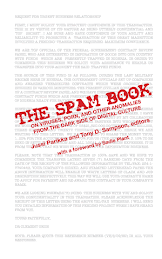David Skinner pulled together with Claire Preston a very nice event at Anglia on Thursday on Trust, Identity and Security. Even if my particular area relating to software and security was not that much covered, the themes interlinked well with some stuff I have been thinking. In terms of such notions of social "glue" as trust, Marek Kohn kicked off with a very general take on the social basis of trust --- although having said "social basis" I need to flag that I was left a bit cold with the too individualized/atomized image of trust that he painted. Too much of the presentation focused on trust outside its historical and institutional settings, using examples that implied it more as a psychological/rationalized/cognitive theme. I disagree with this quite strongly, and was hoping for a discussion more focused on the affective/non-cognitive politics and management of trust in terms of network culture.
In short, my point: a) trust is something guaranteed as a temporal relation in modernity by institutions, b) such institutions have been forced to change and their ability to guarantee the secured future has suffered during what different commentators would call late-capitalism, postmodernity, or for example network culture. This applies to social relations, production and legitimacy of knowledge, economic relations, and huge amount of other key factors. c) Instead of a cognitive relation, institutions have already historically worked on trust as a management of affective states, to put it a bit too broadly. What I mean is that trust works on automation most of the time -- its not a cognitive relation of weighting wins and losses. Its an affective relation that involves the management of futurity as something present; a creation of a condition where future seems as if already present and controllable.
In the other session, presentions by for example David Skinner and Greg Elmer touched interestingly also the topic of futurity. David's talk was on the UK police DNA Database, and very spot on in terms of control through information; not only a creation of "traces" through DNA collection etc., but also through active creation of profiled, targeted "problem groups" -- which happens to be very racially loaded practice. The already existing amount of profiles on the database is very much geared towards collecting from the black communities and through "preemptive profiling", very problematic self-realizing groupings are created. Preempting as a political tool is a good idea/concept that Greg Elmer has been developing (also together with Andy Opel in their book on the topic.) In his video talk, Greg talked about both the concept as one of management of futures, and also on the ongoing online collaboration to create a documentary on the topic. What is preemption? Its about shooting first, asking later -- a practice enabled by a range of non-lethal weapons such as tasers; but also more discursively a mode of governing the present through reacting to "inevitable futures" (where risks are treated as if inevitable events, and hence in need of preemptive actions.) This is the logic of the Bush regime in a way, but not limited to a set of tools by the ex-US Government (and also having clear connections with e.g. Richard Grusin's notion of premediation).
The day ended with Sean Cubitt's different angle to the topic of databases and security. He gave a brilliant genealogy of management of colors and perception through the histories of the raster screen. The same mode of cutting and organizing perception into discreet units that governs the raster screen approach is apparent according to Cubitt also in the database mode of governing through creating units that are inter-exchangeable etc. In a way, I was after Skinner's presentation thinking about how modes of racism and racial profile have moved from the visual regime of e.g. orientalism to the informatics of databases and hence non-visual media, but actually Cubitt made me rethink and realize the possible connections between visual and database media. The technicality inherent in modes of management of perception are already hinting towards the logic of computational databases, seems Cubitt to argue and I have to admit his points were quite convincing even if I am not usually the first person to argue for the centrality of the visual in media cultures (esp. technical).
Showing posts with label identity. Show all posts
Showing posts with label identity. Show all posts
Sunday, 13 September 2009
Subscribe to:
Posts (Atom)







